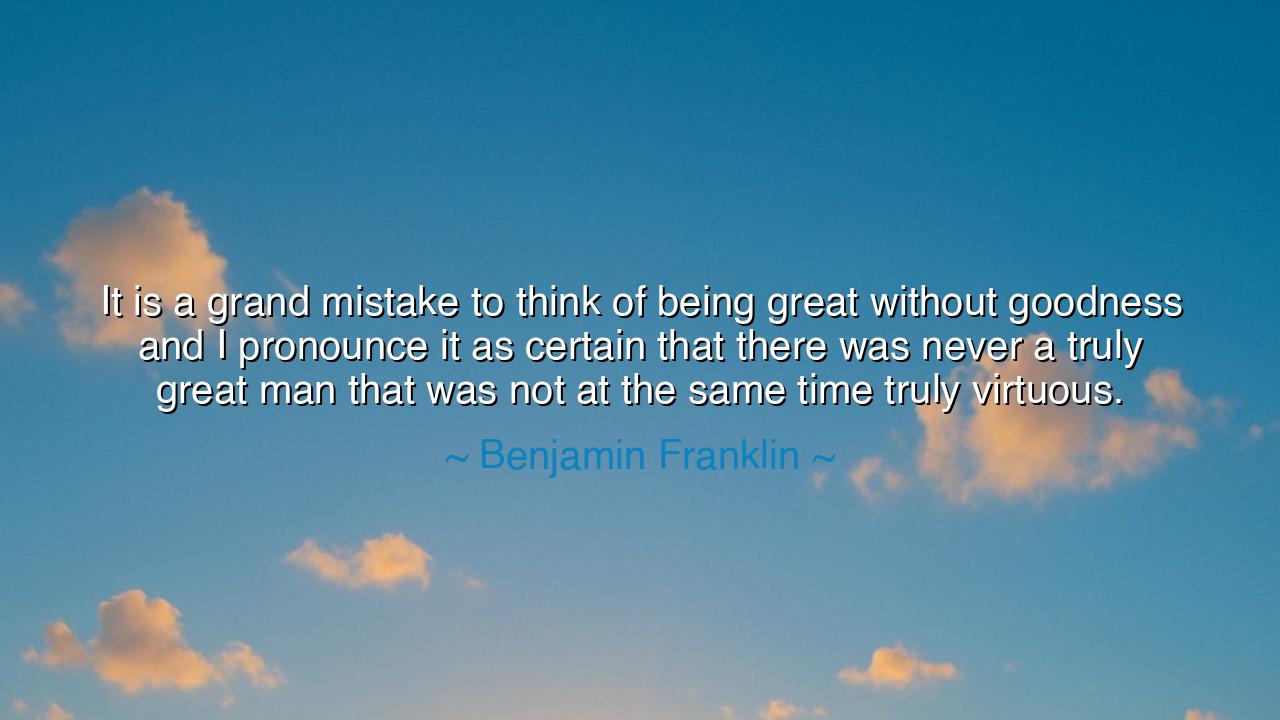
It is a grand mistake to think of being great without goodness
It is a grand mistake to think of being great without goodness and I pronounce it as certain that there was never a truly great man that was not at the same time truly virtuous.






“It is a grand mistake to think of being great without goodness, and I pronounce it as certain that there was never a truly great man that was not at the same time truly virtuous.” So declared Benjamin Franklin, one of the wise architects of a new nation and a philosopher whose words still burn with the quiet fire of moral truth. In this saying, Franklin laid bare a truth that transcends all ages and empires — that greatness without virtue is but a hollow crown, glittering for a moment before crumbling to dust. For he knew that the strength which builds nations, the power that leads men, and the brilliance that shapes history must all be rooted in the soil of goodness, or else they will bear only the bitter fruit of ruin.
Franklin lived in an age of upheaval, when empires fell and new republics were forged. He saw with his own eyes how ambition, when untethered from morality, devoured those who wielded it. Kings and conquerors, priests and politicians — all who sought glory without conscience eventually destroyed themselves. Thus, he spoke not as a dreamer, but as one tempered by experience. He had known wealth and influence, yet he cherished above all the virtues of honesty, humility, and service. His life was proof that the measure of a man lies not in what he controls, but in what he contributes.
To understand his words is to understand that greatness and goodness are not rivals, but twin flames of the same light. True greatness, in Franklin’s view, is not the noise of power, but the quiet influence of character. It is the courage to act justly when no one is watching, to pursue wisdom instead of vanity, and to lead not through fear, but through example. Virtue is the foundation upon which all enduring greatness stands. Without it, the tallest achievements collapse like towers built upon sand.
Consider the story of George Washington, Franklin’s contemporary and companion in the struggle for independence. Washington could have seized power, could have crowned himself king, and history might have praised his might — for a time. But instead, he chose the path of restraint, relinquishing his command and returning to private life. In that act of humility, he became not just a victorious general, but a symbol of republican virtue, a man whose greatness was born of goodness. The world remembers him not because he conquered others, but because he conquered himself.
How different is the fate of those who sought greatness without virtue! The annals of history are littered with their names — men who rose like comets only to burn in the cold of their own corruption. Napoleon, whose genius dazzled Europe, fell not to his enemies, but to his pride. Caesar, who ruled Rome, could not rule his ambition. Their greatness was real, but not righteous; their power immense, but unanchored. And so their legacies, though vast, are marred by the shadow of their own excess. Franklin’s wisdom reminds us that such greatness is but false light, bright and blinding, yet doomed to fade.
For goodness — true goodness — is not weakness, but power refined by love and discipline. It is the moral compass that keeps greatness from becoming tyranny. The man who is truly virtuous commands respect not through force, but through the nobility of his actions. His influence endures beyond his lifetime, for virtue plants seeds that blossom long after the hand that sowed them has turned to dust. Such is the legacy of those who are both great and good — they build not empires of stone, but empires of spirit.
And so, O seekers of wisdom, take Franklin’s counsel to heart. If you would be great, first strive to be good. Cultivate virtue as the soil in which your dreams take root. Let honesty guide your tongue, humility temper your ambition, and compassion shape your strength. Measure your success not by the height of your achievements, but by the purity of your intentions. Remember always that power gained without goodness will one day destroy its wielder, but goodness, even without power, endures forever.
For in the end, as Franklin knew, greatness that lacks virtue is mere noise — loud, fleeting, and forgotten. But greatness joined with goodness becomes music eternal, echoing through generations. Live, then, not for fame, but for character; not to be praised, but to be worthy. For the truly great are not those who rule others, but those who rule themselves — and in their goodness, the world finds its hope.






AAdministratorAdministrator
Welcome, honored guests. Please leave a comment, we will respond soon